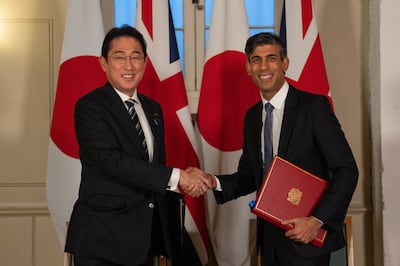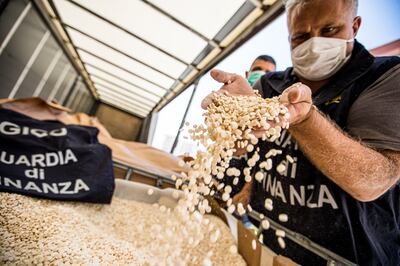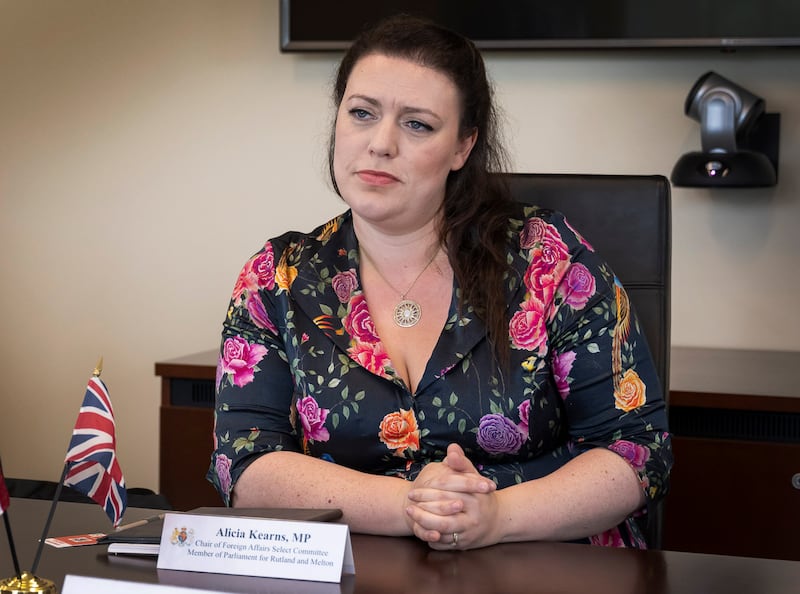The UK needs a greater focus on its relations with the Middle East after tilting too far towards the Indo-Pacific, the chairwoman of the UK Parliament’s Foreign Affairs Committee has said.
Alicia Kearns told The National that Gulf states are looking to “step up” on the world stage and Britain needed to be “part of those conversations”.
In a wide-ranging interview, Ms Kearns said the UK needs to rethink its stance and not forget its historic ties to the region. She also told The National:
- Iran’s Islamic Revolutionary Guards Corps should be designated a terrorist organisation even if that means the UK’s embassy in Tehran is shut down.
- Tehran will continue to take dual citizen hostages and the West must not pay ransom for their release.
- She fears Captagon could soon reach the UK and called for further sanctions on Syria.
- She welcomed the sanctions placed on Riad Salameh and said the UK needs to support Lebanon.
- The UK government needs to challenge any Interpol red notice issued against former Iraqi minister Ali Allawi if it believes it to be malicious.
The tilt towards the Indo Pacific was one of the flagship policies of the UK government’s 2021 Integrated Review of Defence, Security, Development and Foreign Policy.
Foreign Secretary James Cleverly said the UK is “well on our way to becoming the European partner with the broadest, most integrated presence in the Indo-Pacific”. He added he wanted to “make it clear that the Indo-Pacific tilt is here to stay – it is permanent”.
But Ms Kearns, whose committee recently launched an inquiry into the challenges of relations with the Middle East and North Africa, said the policy needs some rethinking by her fellow Conservatives.
“I’ve been very critical of the government over the past two years because I feel the tilt to the Indo-Pacific was a tilt away from the Middle East and there hasn’t been sufficient focus on the Middle East and North Africa,” she said.
“The reality is that a lot of Gulf states are looking to step up on the world stage, particularly Saudi Arabia, which is looking to see itself as a leader of the Islamic world, and we need to make sure we’re part of those conversations.
“But also we have historic commitments and friends across the Middle East and we know the UK’s voice matters in the Middle East. That’s why I want to make sure we recognise that responsibility but also that opportunity and working with historical partners such as Jordan.”
In December, she said Britain’s decision under Boris Johnson to scrap its full-time Middle East minister was “ridiculous” and the post should be fully reinstated. Currently, Lord Ahmad serves in an unpaid role covering the region, as well as South Asia and the UN.
Ms Kearns said she was concerned the situation in Israel and Palestine was “heading towards a third Intifada”.
“I would like to see a special envoy for the Middle East peace process. I think that’s really, really important,” she said.
She has been vocal in her criticism of Iran and she believes it is time the UK proscribed the IRGC as a terrorist organisation.
The UK has so far not followed the US in doing so, amid concerns in the Foreign Office the move could be counterproductive and lead to the embassy in Tehran being closed, making dealing with matters such as hostages more difficult.

The cabinet is also reportedly split between Mr Cleverly and Home Secretary Suella Braverman, who is said to support such a move.
Ms Kearns said: “There are repercussions when you make a decision like this but ultimately I have come to the position that when you have an organisation that’s tried to commit 15 assassinations on British soil, where we know they are entirely hostile to us, it is right that we take action against them and it would allow us to crack down on the finances of the IRGC in London, if we were to take action.
“Ultimately, I think it’s better to proscribe the IRGC than not to because I think in terms of diplomatic access and having a platform on the ground. I’m not convinced that our people are necessarily that safe in the country.”
She also said Iran must not be “incentivised” by the paying of “ransoms” after the freeing from prison of four Americans by Tehran in return for the unfreezing of funds. Among those released to house arrest was 67-year-old environmentalist Morad Tahbaz, who also has British citizenship.
“We don’t support the payment of ransoms because unfortunately we believe that it does encourage terror states to continue to abduct people and hold them for financial gain,” she said.
“But at the same time, I can’t say I’m not absolutely delighted to see Morad out of Evin.
“This is the complex world we live in but what we can’t be doing is incentivise the Iranian regime to take more hostages.
“Unfortunately, what we’ve seen with the Iranian government is that they will continue to take hostages, time and time and time again. The way the Iranians work is that as soon as somebody is released, they fill the pool with somebody else.”
During the interview, Ms Kearns spoke of her fondness for Lebanon, which she said was “a country that I love visiting and a country that I’ve worked in the past”.
She welcomed the sanctions imposed by the UK on Riad Salameh, the former governor of the country’s central bank, and his close associates.
The 73-year-old is under scrutiny in several domestic and international investigations for the alleged embezzlement of $330 million from Lebanon's central bank that was funnelled into properties across Europe and the UK, where more than $130 million worth of assets associated with him have been frozen.
“This is a particularly egregious case so I think it is meaningful that we will do anti-corruption sanctions in Lebanon,” she said. “The Lebanese people have gone through a horrendous time in recent years.

“It’s a strong signal, the fact that we’ve taken action with our allies specifically against Riad Salameh. But if I’m honest, it’s Lebanon itself that has to decide it no longer wants corruption.”
Ms Kearns recently accused Interpol of letting its system of Red Notices be used by governments to pursue political opponents.
The issue reared its head recently when an Interpol red notice request was issued by Iraq to arrest high-ranking former politicians including former finance minister Ali Allawi, who is a UK citizen.
“The Interpol secretary general himself has said he relies on member states to challenge red notices where we recognise them to be malicious,” MS Kearns said.
“The people who can challenge this Red Notice is the British government because he’s a UK citizen and it is the duty. So the UK government is the one to take the lead on that, if we accept that it is.”

Amid fears Captagon could be heading to Europe, she said it was important the world “take the trade really seriously”.
“I’m concerned with the high levels of consumption in places like Saudi Arabia and places like that, that we will see Captagon coming to UK shores,” she explained.
“We have to make this a priority for us and what we do not need to see is the flooding of a new drug to British shores. This is essentially a form of foreign policy the [Syrian President Bashar Al] Assad regime has chosen to adopt.
“Their family have benefitted from it and we still have members of Assad’s family travelling to and from the UK when we know they are involved with the Captagon trade.
“So I would like to see significant sanctions put in place and also make sure we take action now on Captagon.”






